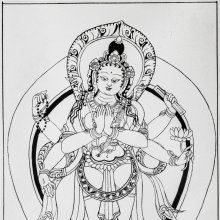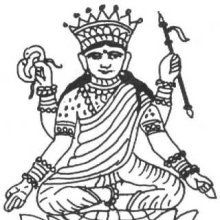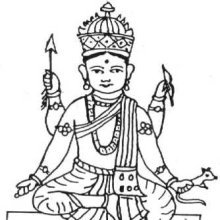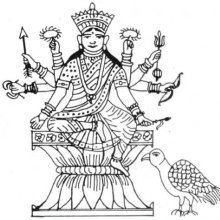Varada, Varadā, Vāraḍa, Vara-da: 30 definitions
Introduction:
Varada means something in Buddhism, Pali, Hinduism, Sanskrit, the history of ancient India, Marathi, Jainism, Prakrit, biology. If you want to know the exact meaning, history, etymology or English translation of this term then check out the descriptions on this page. Add your comment or reference to a book if you want to contribute to this summary article.
Images (photo gallery)
(+139 more images available)
In Hinduism
Ayurveda (science of life)
Nighantu (Synonyms and Characteristics of Drugs and technical terms)
Source: WorldCat: Rāj nighaṇṭuVaradā (वरदा) is another name for Ādityabhaktā, a medicinal plant, possibly identified with Helianthus annuus Linn. or “common sunflower” from the Asteraceae or “daisy” family of flowering plants, according to verse 4.179-181 of the 13th-century Raj Nighantu or Rājanighaṇṭu. The fourth chapter (śatāhvādi-varga) of this book enumerates eighty varieties of small plants (pṛthu-kṣupa). Together with the names Varadā and Ādityabhaktā, there are a total of eighteen Sanskrit synonyms identified for this plant.
Unclassified Ayurveda definitions
Source: Wisdom Library: Āyurveda and botany1) Vāraḍa (वारड) is a Sanskrit word referring to the “spoonbill”. The meat of this animal is part of the māṃsavarga (‘group of flesh’), which is used throughout Ayurvedic literature. The animal Vāraḍa is part of the group of birds named Vartakādi, which is a sub-group of Viṣkira, refering to “birds similar to common quail who eat while scattering the gains”. It was classified by Caraka in his Carakasaṃhitā sūtrasthāna (chapter 27), a classical Ayurvedic work. Caraka defined such groups (vargas) based on the dietic properties of the substance.
2) Varadā (वरदा) is another name (synonym) for Ajagandhā, which is the Sanskrit word for Cleome gynandra (stinkweed), a plant from the Cleomaceae family. Ajagandhā is also known as Tilaparṇikā, which is classified as a vegetable (śāka) by Caraka in his Carakasaṃhitā sūtrasthāna (chapter 27), a classical Ayurvedic work.
Varadā was identified as a synonym for Ajagandhā in the Bhāvaprakāśa, which is a 16th-century medicinal thesaurus authored by Bhāvamiśra.

Āyurveda (आयुर्वेद, ayurveda) is a branch of Indian science dealing with medicine, herbalism, taxology, anatomy, surgery, alchemy and related topics. Traditional practice of Āyurveda in ancient India dates back to at least the first millenium BC. Literature is commonly written in Sanskrit using various poetic metres.
Vastushastra (architecture)
Source: Wisdom Library: Vāstu-śāstraVarada (वरद) refers to classification of a temple/buidling (prāsāda), according to Samarāṅgaṇasūtradhāra chapter 60. The temple is mentioned in a list of thirty-six Prāsādas having activities of the townsmen entailing Sādhārās. The Samarāṅgaṇasūtradhāra is an 11th-century encyclopedia dealing with various topics from the Vāstuśāstra.

Vastushastra (वास्तुशास्त्र, vāstuśāstra) refers to the ancient Indian science (shastra) of architecture (vastu), dealing with topics such architecture, sculpture, town-building, fort building and various other constructions. Vastu also deals with the philosophy of the architectural relation with the cosmic universe.
Purana and Itihasa (epic history)
Source: Wisdom Library: Skanda-puranaVarada (वरद, “boon-giver”) refers to one of the fifty-six vināyakas located at Kāśī (Vārāṇasī), and forms part of a sacred pilgrimage (yātrā), described in the Kāśīkhaṇḍa (Skanda-purāṇa 4.2.57). He is also known as Varadavināyaka, Varadagaṇeśa and Varadavighneśa. These fifty-six vināyakas are positioned at the eight cardinal points in seven concentric circles (8x7). They center around a deity named Ḍhuṇḍhirāja (or Ḍhuṇḍhi-vināyaka) positioned near the Viśvanātha temple, which lies at the heart of Kāśī, near the Gaṅges. This arrangement symbolises the interconnecting relationship of the macrocosmos, the mesocosmos and the microcosmos.
Varada is positioned in the North-Eastern corner of the third circle of the kāśī-maṇḍala. According to Rana Singh (source), his shrine is located at “Rajghat area, Prahlad Ghat, A 13 / 19”. Worshippers of Varada will benefit from his quality, which is defined as “the giver of all sorts of boons”. His coordinates are: Lat. 25.19421, Lon. 83.01700 (or, 25°11'39.2"N, 83°01'01.2"E) (Google maps)
Varada, and the other vināyakas, are described in the Skandapurāṇa (the largest of the eighteen mahāpurāṇas). This book narrates the details and legends surrounding numerous holy pilgrimages (tīrtha-māhātmya) throughout India. It is composed of over 81,000 metrical verses with the core text dating from the before the 4th-century CE.
Source: archive.org: Puranic EncyclopediaVarada (वरद).—A warrior of Subrahmaṇya (Mahābhārata, Śalya Parva, Chapter 45, Stanza 64).
Source: archive.org: Shiva Purana - English Translation1) Varada (वरद) refers to the “bestower of the boon” which is mentioned as being held in one of the hands (hasta) of the Goddess (Devī), according to the Śivapurāṇa 2.2.12. Accordingly as Brahmā narrated to Nārada:—“[...] with various sorts of prayer [Dakṣa] eulogised and bowed to the Goddess (Devī) mother of the universe, Kālikā seated on a lion, dark-complexioned, with four arms (caturbhuja) and beautiful face, the bestower of the boon (varada), the abode of safety, holding a blue lotus and the sword in her hands (hasta), comely with reddish eyes and with beautiful dishevelled hair”.
2) Varada (वरद) refers to the “bestower of boons” and is used to describe Śiva, according to the Śivapurāṇa 2.2.42.—Accordingly, as Dakṣa bowed and eulogised Śiva:—“I bow to the great lord, the supreme being, the bestower of boons (i.e., Varada), the store of knowledge, the eternal. I bow to Śiva, the lord of the chief of Gods, always conferring happiness and the sole kinsman of the universe. I bow to the lord of the universe, of cosmic form, the primordial Being and the form of Brahman itself. I bow to Śiva, the conceiver of world’s happiness and the greater than the greatest. [...]”.
Source: Cologne Digital Sanskrit Dictionaries: The Purana Index1) Varada (वरद).—A name of Vighneśvara.*
- * Brahmāṇḍa-purāṇa IV. 44. 69.
2) Varadā (वरदा).—(River) one of the seven rivers in Śivapuram.*
- * Vāyu-purāṇa 101. 243.
Varada (वरद) refers to the name of a River or Tīrtha (pilgrim’s destination) mentioned in the Mahābhārata (cf. III.83.31). Note: The Mahābhārata (mentioning Varada) is a Sanskrit epic poem consisting of 100,000 ślokas (metrical verses) and is over 2000 years old.
Varada is also mentioned in the Mahābhārata (cf. IX.44.59) and represents one of the many proper names used for people and places.

The Purana (पुराण, purāṇas) refers to Sanskrit literature preserving ancient India’s vast cultural history, including historical legends, religious ceremonies, various arts and sciences. The eighteen mahapuranas total over 400,000 shlokas (metrical couplets) and date to at least several centuries BCE.
Shilpashastra (iconography)
Source: Wisdom Library: Śilpa-śāstraVarada (वरद) is a Sanskrit name referring to one of the eight manifestations of Unmatta, who is a form of Bhairava. According to the Rudrayāmala, there are eight main forms of Bhairava who control the eight directions of this universe. Each form (e.g., Unmatta) has a further eight sub-manifestations (e.g., Varada), thus resulting in a total of 64 Bhairavas.
When depicting Varada according to traditional iconographic rules (śilpaśāstra), one should depcit him (and other forms of Unmatta) having a white color and good looks; he should carry in his hands the kuṇḍa, the kheṭaka, the parigha (a kind of club) and bhiṇḍipāla. The word Śilpaśāstra refers to an ancient Hindu science of arts and crafts, dealing with subjects such as painting, sculpture and iconography.
Source: Shodhganga: The significance of the mūla-beras (śilpa)Varada (वरद) or Varadahasta refers to “benevolence” and represents one of the twenty-four gestures with a single hand, as defined according to texts dealing with śilpa (arts and crafs), known as śilpaśāstras.—Accordingly, pratimā-lakṣaṇa (body postures of the icons) is comprised of hand gestures (hasta, mudrā or kai-amaiti), stances/poses (āsanas) and inflexions of the body (bhaṅgas). There are thirty-two types of hands [viz., varada-hasta] classified into two major groups known as tolirkai (functional and expressive gestures) and elirkai (graceful posture of the hand).

Shilpashastra (शिल्पशास्त्र, śilpaśāstra) represents the ancient Indian science (shastra) of creative arts (shilpa) such as sculpture, iconography and painting. Closely related to Vastushastra (architecture), they often share the same literature.
Shaivism (Shaiva philosophy)
Source: Wisdom Library: ŚaivismVarada (वरद) is the Sanskrit name of a deity presiding over Liṅgeśvara, one of the sixty-eight places hosting a svāyambhuvaliṅga, which is one of the most sacred of liṅgas according to the Śaivāgamas. The list of sixty-eight svāyambhuvaliṅgas and presiding deities (e.g., Varada) is found in the commentary on the Jirṇoddhāra-daśaka by Nigamajñānadeva. The word liṅga refers to a symbol used in the worship of Śiva and is used thoughout Śaiva literature, such as the sacred Āgamas.
Source: SOAS University of London: Protective Rites in the Netra TantraVarada (वरद) or Varadapāṇika refers to the “hand positions of granting wishes”, according to the Netratantra of Kṣemarāja: a Śaiva text from the 9th century in which Śiva (Bhairava) teaches Pārvatī topics such as metaphysics, cosmology, and soteriology.—Accordingly, [verse 3.17-23, while describing a meditation on Amṛteśa in his form as Mṛtyujit]—“And so now, having constructed the amṛtāmudrā or the padmamudrā, [the Mantrin] should meditate on the Ātman. [...] [He is] one-faced, three-eyed, seated on a white lotus, fixed in the bound lotus seat. [He is] four-armed, large-eyed, the hand [fixed in the position] of granting wishes and safety (varada-pāṇika—varadābhayapāṇikam), [holding] a full moon, radiant, filled with amṛta, holding a water pot, [and] completely full of the world, the moon in his lovely hand. [The Mantrin] should remember him adorned with a reverence that is all white”.

Shaiva (शैव, śaiva) or Shaivism (śaivism) represents a tradition of Hinduism worshiping Shiva as the supreme being. Closely related to Shaktism, Shaiva literature includes a range of scriptures, including Tantras, while the root of this tradition may be traced back to the ancient Vedas.
Shaktism (Shakta philosophy)
Source: Google Books: Manthanabhairavatantram1) Varada (वरद) refers to one of the disciples of Śaṅkara, who is associated with Jālandhara, one of the sacred seats (pīṭha), according to the Manthānabhairavatantra, a vast sprawling work that belongs to a corpus of Tantric texts concerned with the worship of the goddess Kubjikā.—The colophons of the version of the Śrīmatottara called Gorakṣasaṃhitā declare that the Kubjikā tradition (the Kādibheda) of the Kulakaulamata was brought down to earth by him. Thus like the Siddhas of the previous Ages, Śrīkaṇṭha also had disciples [i.e., Varada]. These were the Lords of the Ages who are said to be four aspects of the First Siddha who descend into the world in the last Age, each into a ‘particular division’.
2) Varada (वरद) refers to a “boon-bestowing gesture”, according to the Śrīmatottara-tantra, an expansion of the Kubjikāmatatantra: the earliest popular and most authoritative Tantra of the Kubjikā cult.—Accordingly, [while describing the visualized form of Navātman Bhairava]: “[...] Navātman’s mind is blissful with his own energy and he is delighted by the bliss of (spiritual) wine. [...] He has eighteen arms and is adorned with many ornaments. A skull, conch, noose, gaud, (a threatening gesture with the) index finger, bow, shield and a club studded with iron are on the left hand side. O dear one, a trident, double-headed drum, sword, ascetic’s staff, pestle, bell, thread, arrow and boon-bestowing gesture (varada) are on the right”.

Shakta (शाक्त, śākta) or Shaktism (śāktism) represents a tradition of Hinduism where the Goddess (Devi) is revered and worshipped. Shakta literature includes a range of scriptures, including various Agamas and Tantras, although its roots may be traced back to the Vedas.
In Buddhism
Tibetan Buddhism (Vajrayana or tantric Buddhism)
Source: archive.org: The Indian Buddhist IconographyVarada (वरद) or Varadatārā refers to a deity from the Green Tārā family, according to Buddhist Iconography.—Varada Tārā sits m the Ardhaparyaṅka attitude like Āryatārā but she can be easily recognised by the presence of four goddesses Aśokakāntā Mārīcī, Mahāmāyūrī, Ekajaṭā and Jāṅgulī. (cf. Mahāśrī Tārā). [...] Strictly speaking, only those deities can be called Tārās to whom the mantra: “oṃ tārā tuttāre ture svāhā” is assigned. [...] From the colour of the different Tārās it will be possible to refer them [viz., Varada] to their respective Kulas or families presided over by the five Dhyāni Buddhas.
Source: Rangjung Yeshe Wiki: Dharma DictionaryVarada (वरद) or Varadatārā (in Tibetan: 'phags ma mchog stsal sgrol ma) refers to the “Tārā who is the granter of boons” and represents one of the twenty-one emanations of Tārā according to the Kashmiri Mahasiddha Suryagupta Tradition.—Suryagupta or Ravigupta (Tibetan: nyi ma be pa) was a layperson from Kashmir that was cured of leprosy by a miraculous statue of the goddess Tara. Suryagupta is famous for having many visions of Tara and originating many lineages of her practice such as the Twenty-one forms of Tara [e.g., Varada-tārā]. There exists inscriptions and paintings (from the 14th century) of these Twenty-one Taras and they are also described in ritual and meditation texts in both Sanskrit and Tibetan language.

Tibetan Buddhism includes schools such as Nyingma, Kadampa, Kagyu and Gelug. Their primary canon of literature is divided in two broad categories: The Kangyur, which consists of Buddha’s words, and the Tengyur, which includes commentaries from various sources. Esotericism and tantra techniques (vajrayāna) are collected indepently.
India history and geography
Source: archive.org: Geography in Ancient Indian inscriptionsVaradā (वरदा) is the name of a river found in India.—The river is identical with modern Wardhā, a tributary of the Godavarī. Kālidāsa mentions the river Varadā as dividing the country of Vidarbha.

The history of India traces the identification of countries, villages, towns and other regions of India, as well as mythology, zoology, royal dynasties, rulers, tribes, local festivities and traditions and regional languages. Ancient India enjoyed religious freedom and encourages the path of Dharma, a concept common to Buddhism, Hinduism, and Jainism.
Biology (plants and animals)
Source: Google Books: CRC World Dictionary (Regional names)1) Varada in India is the name of a plant defined with Cleome viscosa in various botanical sources. This page contains potential references in Ayurveda, modern medicine, and other folk traditions or local practices It has the synonym Sinapistrum viscosum Moench (among others).
2) Varada is also identified with Withania somnifera It has the synonym Withania kansuensis K.Z. Kuang & A.M. Lu (etc.).
Example references for further research on medicinal uses or toxicity (see latin names for full list):
· Nuovo Giorn. Bot. Ital. (1927)
· Journal of Ethnopharmacology (1994)
· Mitt. Bot. Staatssamml. Munchen (1951)
· Flora Brasiliensis (1865)
· Fl. Australia (1998)
· Acta Bot. Indica (1975)
If you are looking for specific details regarding Varada, for example health benefits, side effects, chemical composition, pregnancy safety, diet and recipes, extract dosage, have a look at these references.

This sections includes definitions from the five kingdoms of living things: Animals, Plants, Fungi, Protists and Monera. It will include both the official binomial nomenclature (scientific names usually in Latin) as well as regional spellings and variants.
Languages of India and abroad
Pali-English dictionary
Source: BuddhaSasana: Concise Pali-English Dictionaryvarada : (adj.) giver of the best things.

Pali is the language of the Tipiṭaka, which is the sacred canon of Theravāda Buddhism and contains much of the Buddha’s speech. Closeley related to Sanskrit, both languages are used interchangeably between religions.
Marathi-English dictionary
Source: DDSA: The Molesworth Marathi and English Dictionaryvarada (वरद).—a S Granting a prayer; conferring a boon or blessing. 2 Propitious, favorable, kindly.
Source: DDSA: The Aryabhusan school dictionary, Marathi-Englishvarada (वरद).—a Granting a prayer, conferring a boon.
Marathi is an Indo-European language having over 70 million native speakers people in (predominantly) Maharashtra India. Marathi, like many other Indo-Aryan languages, evolved from early forms of Prakrit, which itself is a subset of Sanskrit, one of the most ancient languages of the world.
Sanskrit dictionary
Source: DDSA: The practical Sanskrit-English dictionaryVarada (वरद).—a.
1) conferring a boon, granting or fulfilling a boon; आगच्छ वरदे देवि जपे मे संनिधौ भव (āgaccha varade devi jape me saṃnidhau bhava) Sandhyā.
2) propitious. (-daḥ) 1 a benefactor.
2) Name of a class of Manes.
3) fire for propitiatory burnt offerings. °चतुर्थी (caturthī) Name of the 4th day in the bright half of माघ, °हस्तः (māgha, °hastaḥ) the boon-giving or beneficent hand (placed on the head of a suppliant by a deity &c.). (-dā) 1 Name of a river; वरद वरदारोधोवृक्षैः सहावनतो रिपुः (varada varadārodhovṛkṣaiḥ sahāvanato ripuḥ) M.5.1.
2) a maiden, girl.
Varada is a Sanskrit compound consisting of the terms vara and da (द).
Source: Cologne Digital Sanskrit Dictionaries: Shabda-Sagara Sanskrit-English DictionaryVarada (वरद).—mfn.
(-daḥ-dā-daṃ) 1. Granting a prayer, conferring a boon. 2. Propitious, favourable. m.
(-daḥ) 1. A benefactor. 2. Fire for burntofferings of a propitiatory character. f.
(-dā) A girl, a virgin. E. vara a blessing, &c., da who gives.
Source: Cologne Digital Sanskrit Dictionaries: Benfey Sanskrit-English DictionaryVarada (वरद).—[vara-da], I. adj. 1. Conferring a boon, or boons,
Varada (वरद).—[adjective] granting or fulfilling wishes; [masculine] benefactor; [feminine] ā [Name] of a river.
Source: Cologne Digital Sanskrit Dictionaries: Aufrecht Catalogus Catalogorum1) Varada (वरद) as mentioned in Aufrecht’s Catalogus Catalogorum:—an inhabitant of Toṇḍīramaṇḍala, son of Śrīnivāsa: Anaṅgajīvana bhāṇa.
2) Varada (वरद):—son of Śrīnivāsa: Āśaucanirṇaya. Hz. 1503 p. 142. He availed himself of the Āśaucadaśaka and Āśaucaśataka.
Source: Cologne Digital Sanskrit Dictionaries: Monier-Williams Sanskrit-English Dictionary1) Varada (वरद):—[=vara-da] [from vara] mf(ā)n. granting wishes, conferring a boon, ready to fulfil requests or answer prayers (said of gods and men), [Atharva-veda; Śvetāśvatara-upaniṣad; Taittirīya-āraṇyaka] etc.
2) [v.s. ...] m. a benefactor, [Horace H. Wilson]
3) [v.s. ...] Name of Agni in Śāntika, [Gṛhyāsaṃgraha]
4) [v.s. ...] fire for burnt offerings of a propitiatory character, [Horace H. Wilson]
5) [v.s. ...] Name of one of Skanda’s attendants, [Mahābhārata]
6) [v.s. ...] of a [particular] class of deceased ancestors, [Mārkaṇḍeya-purāṇa]
7) [v.s. ...] of a [particular] Samādhi, [Kāraṇḍa-vyūha]
8) [v.s. ...] of one of the 7 Ṛṣis in the 4th Manv-antara, [Viṣṇu-purāṇa]
9) [v.s. ...] of a Dhyāni-buddha, [Horace H. Wilson]
10) [v.s. ...] (mostly with ācārya, kavi, deśika, bhaṭṭāraka or deśika āc) Name of various authors and other men, [Catalogue(s)]
11) [v.s. ...] [plural] Name of a people, [Rāmāyaṇa]
12) Varadā (वरदा):—[=vara-dā] [from vara-da > vara] f. a young woman, girl, maiden, [cf. Lexicographers, esp. such as amarasiṃha, halāyudha, hemacandra, etc.]
13) [v.s. ...] Name of a guardian goddess in the family of Vara-tantu, [Catalogue(s)]
14) [v.s. ...] of a Yoginī, [Hemādri’s Caturvarga-cintāmaṇi] (cf. vara-pradā)
15) [v.s. ...] of various plants, Physalis Flexuosa, [Bhāvaprakāśa; Nighaṇṭuprakāśa]
16) [v.s. ...] Polanisia Icosandra, [cf. Lexicographers, esp. such as amarasiṃha, halāyudha, hemacandra, etc.]
17) [v.s. ...] Helianthus, [Nighaṇṭuprakāśa]
18) [v.s. ...] Linum Usitatissimum, [Bhāvaprakāśa]
19) [v.s. ...] the root of yam, [ib.]
20) [v.s. ...] = tri-parṇī, [Nighaṇṭuprakāśa]
21) [v.s. ...] Name of a river, [Mahābhārata; Kāvya literature]
Source: Cologne Digital Sanskrit Dictionaries: Yates Sanskrit-English DictionaryVarada (वरद):—[vara-da] (daḥ-dā-daṃ) a. Granting a boon; propitious. m. A benefactor; sacrificial fire. f. A virgin.
[Sanskrit to German]
Sanskrit, also spelled संस्कृतम् (saṃskṛtam), is an ancient language of India commonly seen as the grandmother of the Indo-European language family (even English!). Closely allied with Prakrit and Pali, Sanskrit is more exhaustive in both grammar and terms and has the most extensive collection of literature in the world, greatly surpassing its sister-languages Greek and Latin.
Prakrit-English dictionary
Source: DDSA: Paia-sadda-mahannavo; a comprehensive Prakrit Hindi dictionary1) Varaḍā (वरडा) in the Prakrit language is related to the Sanskrit word: Varaṭā.
Varaḍā has the following synonyms: Varaḍī.
2) Varāḍa (वराड) also relates to the Sanskrit word: Varāṭa.
2) Varāḍa has the following synonyms: Varāḍaga, Varāḍaya.
Prakrit is an ancient language closely associated with both Pali and Sanskrit. Jain literature is often composed in this language or sub-dialects, such as the Agamas and their commentaries which are written in Ardhamagadhi and Maharashtri Prakrit. The earliest extant texts can be dated to as early as the 4th century BCE although core portions might be older.
Kannada-English dictionary
Source: Alar: Kannada-English corpusVaraḍa (ವರಡ):—
1) [noun] (arch.) a kind of tax.
2) [noun] subscription or donation received from public.
--- OR ---
Varada (ವರದ):—[adjective] having or showing kindness, couresy; gracious; benevolent.
--- OR ---
Varada (ವರದ):—
1) [noun] that which is gracious, benevolent.
2) [noun] he who is gracious, benevolent and gives boon to.
--- OR ---
Varāḍa (ವರಾಡ):—
1) [noun] (arch.) a kind of tax.
2) [noun] subscription or donation received from public.
Kannada is a Dravidian language (as opposed to the Indo-European language family) mainly spoken in the southwestern region of India.
See also (Relevant definitions)
Partial matches: Vara, Da, Ta.
Starts with (+89): Vara-tatanal-vantatumutittal, Varada acarya, Varada bhattaraka, Varada deshika, Varada deshika acarya, Varada kavi, Varada vatsya, Varada yajvan, Varadabhatta, Varadabhaya, Varadabhayahasta, Varadacaturthi, Varadacaturthivrata, Varadadhisha yajvan, Varadadhishayajvan, Varadaga, Varadaganapatistotra, Varadaganesha, Varadaganeshasahasranamastotra, Varadaganeshastotra.
Ends with (+1): Ahuyavarada, Atyantavarada, Avarada, Bhaktavarada, Bilvarada, Cinavarada, Cinivarada, Cinnavarada, Elevarada, Javarada, Jihvarada, Kalluvarada, Kanikevarada, Kiruvarada, Kudurevarada, Odavarada, Rannavarada, Sonnevarada, Vaduvarada, Varadavarada.
Full-text (+380): Varadacaturthi, Varata, Varadamudra, Varadatantra, Samdhyavidya, Varadarajiya, Varadahasta, Varadaraja, Varadi, Varaprada, Varadarajastava, Varadarajashataka, Varadarajashtaka, Varadarajasuprabhata, Varadabhatta, Varadamurti, Varadarajacampu, Varadarajadandaka, Varadarajamula, Varadarajamangala.
Relevant text
Search found 61 books and stories containing Varada, Varadā, Vāraḍa, Vara-da, Vara-dā, Varaḍā, Varāḍa, Varaḍa; (plurals include: Varadas, Varadās, Vāraḍas, das, dās, Varaḍās, Varāḍas, Varaḍas). You can also click to the full overview containing English textual excerpts. Below are direct links for the most relevant articles:
Garga Samhita (English) (by Danavir Goswami)
Verse 5.21.7 < [Chapter 21 - The Story of Śrī Nārada]
The Agni Purana (by N. Gangadharan)
Chapter 146 - Names of different Goddesses
Chapter 310 - The narration of the spell relating to Tvaritā
Jain Remains of Ancient Bengal (by Shubha Majumder)
Appendix 1 - The Position of Yakṣas and Yakṣiṇīs in Jainism
Jain Tutelary Couple or Parents of the Tīrthaṅkaras < [Chapter 6 - Iconographic Study of Jaina Sculptural Remains]
Miniature Tīrthaṅkara and Planatary Deities type of Śāntinātha < [Chapter 6 - Iconographic Study of Jaina Sculptural Remains]
Kulamrit Stotra < [The Divine Strotras]
Jainism in Odisha (Orissa) (by Ashis Ranjan Sahoo)
Iconography of Jain Gods and Goddess < [Chapter 6]
Iconography of Sasanadevis < [Chapter 6]
Ramachandi Temple (Keonjhar) < [Chapter 3: Survey of Jaina Antiquities in Odisha]
Women in the Atharva-veda Samhita (by Pranab Jyoti Kalita)
28. Goddess Vedamātā < [Chapter 4 - Female Deities and the Glorification of Women in the Atharvaveda]





